May 22, 2025 | 14:21 GMT +7
May 22, 2025 | 14:21 GMT +7
Hotline: 0913.378.918
May 22, 2025 | 14:21 GMT +7
Hotline: 0913.378.918
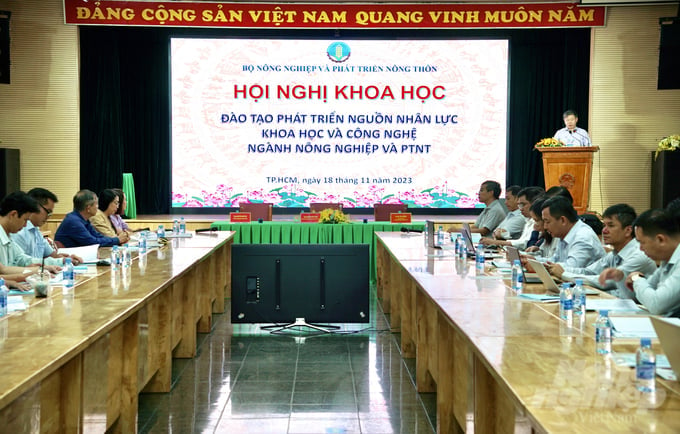
At the scientific conference on the training and development of human resources in science and technology within the agriculture and rural development sector organized by the Ministry of Agriculture and Rural Development on November 18, various institutes, universities, and agencies unanimously acknowledged that the current state of human resources in science and technology within the agriculture and rural development sector, especially high-quality human resources, is facing shortages and severe limitations. Accordingly, the supply fails to meet demand, and there is a shortage of adequately trained and skilled labor.
College admissions in the agricultural sector are currently encountering numerous difficulties. Despite constituting at least 30% of the national labor force, students applying to study agriculture represent less than 2% of the total students enrolled annually.
Statistical results from universities under the Ministry of Agriculture and Rural Development indicated that in the years between 2016 and 2020, students registering for agriculture, forestry, irrigation, and aquaculture fields decreased by over 30% compared the figure in the years between 2011 and 2015. Notably, several traditional agricultural majors have experienced a shortage of enrolling students. Specialized majors such as soil science, agricultural land development, aquacultural exploitation, and agricultural mechanics are also facing difficulties in enrollment.
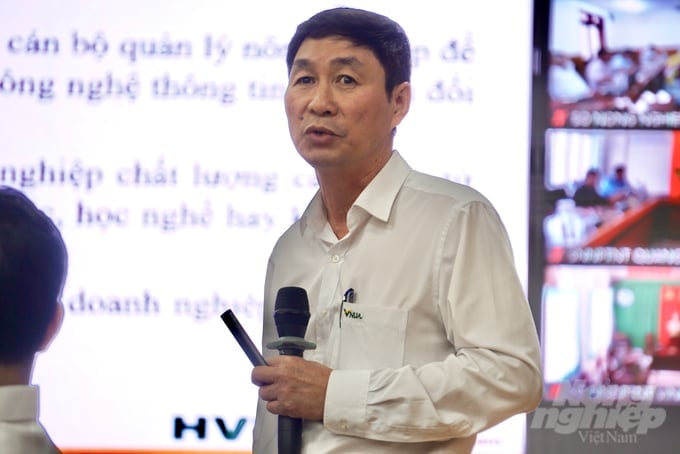
Associate Professor Phan Xuan Hao, Deputy Head of the Training Management Department at the Vietnam National University of Agriculture, sharing at the conference. Photo: Nguyen Thuy.
According to Associate Professor Phan Xuan Hao, Deputy Head of the Training Management Department at the Vietnam National University of Agriculture, the overall target for doctoral and master's degrees in regular programs is decreasing from 2021 to 2023 nationwide. Accordingly, various majors including environment, environmental protection, and especially agriculture, forestry, and aquaculture, have seen a 0.86% reduction. Notably, the agriculture, forestry and aquaculture major saw a decrease of 44% in 2020, 62% in 2021, and 49% in 2022. "Without the attention and support from the Ministry, management agencies, and businesses, the decline will continue to grow rapidly in the near future," Associate Professor Hao emphasized.
Regarding the causes for the decline in high-quality human resources in science and technology within the agriculture and rural development sector, Professor Tran Ba Hoang, Director of the Southern Institute of Water Resources Research, attributed the decline to the low input quality of the current education system. For instance, Thuyloi University enrolls between 4,000 and 5,000 students annually. However, the University only admits between 200 and 300 students in the water resources sector.
"Without fundamental and long-term solutions, or macro policies from the state, in ten to twenty years from now, the high-quality human resources in science and technology from various institutes will face significant challenges," Professor Hoang asserted.
Mr. Nguyen Van Nguyen, Deputy Director of the Research Institute for Marine Fisheries noted that various agencies, especially institutes and local governments, have a significant demand for high-quality human resources in the fisheries sector. However, specialized trainers in this sector are currently in short supply. In reality, the fisheries sector has failed to attract a significant number of students, and many graduates find it challenging to secure employment, especially in the field of exploitation, thereby making the sector less appealing to prospective students.
Moreover, non-specialized programs, such as politics and military studies, requires substantial time investments in their curriculum. According to Mr. Nguyen, it is necessary to reduce the scale of these programs and implement policies to attract students. Moreover, post-graduation job positions need to be more clearly defined, with policies to attract, encourage, and efficiently utilize high-quality human resources.
"At present, the fisheries sector has been unable to attract an input of high-quality students. Additionally, various shortcomings within the curriculum framework must be addressed. We need to enhance coordination, international cooperation, and collaboration between universities, institutes, and businesses to improve the quality of trainers," Mr. Nguyen explained.

Associate Professor Tran Ba Hoang, Director of the Southern Institute of Water Resources Research. Photo: Nguyen Thuy.
One of the pressing challenges currently faced by the leadership of public research institutions and universities in the agriculture and rural development sector is the issue of "brain drain," namely in the context of financial autonomy.
The Director of the Southern Institute of Water Resources Science believes that the income of scientific staff is lower compared to other professions, making it difficult to attract talented individuals. "Despite our efforts and additional contract services to increase income for our staff, it is still lower compared to external standards. Even if our staff performs exceptionally and puts in great effort, we can only pay them 15 to 20 million Vietnamese dong (approximately 650 to 870 USD) per month, whereas international organizations are willing to pay 2,000 USD per month. As a result, it is challenging to retain a staff of high-quality personnel," he stated.
Similarly, the Deputy Director of the Research Institute for Marine Fisheries revealed that the Institute had 140 staff members in 2017, but their staff currently comprises of only over 110 personnel. "Our staff with ten years of experience earns approximately 6 million Vietnamese dong (approximately 260 USD) per month. However, they can earn up to 50 million Vietnamese dong (approximately 2,170 USD) per month if they leave the institute.
One fundamental solution is to make substantial leaps in income and ensure a standard livelihood. Some talented students can only be retained with considerable effort and a salary of 8 million Vietnamese dong (approximately 350 USD) per month. However, the majority of them find this to be an unlivable wage; which is why our human resources are shrinking," Professor Nguyen shared.
The Vietnam Academy of Agricultural Sciences (VAAS) employed a total of 2,623 personnel in 2021, including 27 professors, associate professors, and 263 doctors. However, as of June 2023, VAAS's workforce has dropped to only 1,964 personnel, including 17 professors, associate professors, and 252 doctors.
On the other hand, the Vietnam Academy of Forest Sciences (VAFS), 94 personnel have submitted their resignation letters. This figure includes over 10 officials who have completed their doctoral degrees abroad and resigned without returning to Vietnam; 11 officials who have finished their training abroad, returned to Vietnam and are either actively working or have requested unpaid leave before officially resigning.
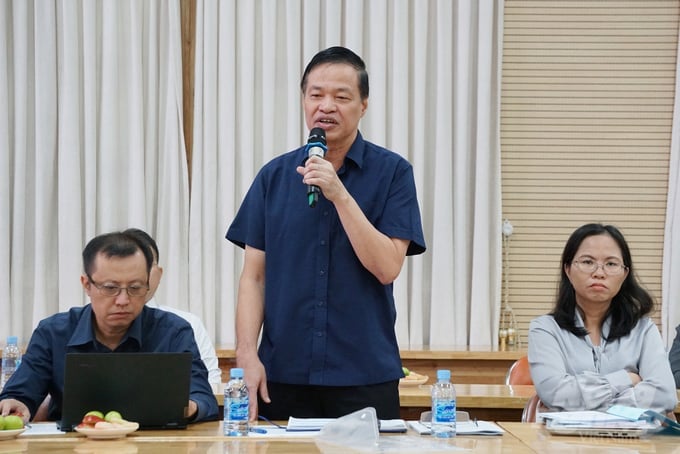
Professor Dr. Vo Dai Hai, Director of the Vietnamese Academy of Forest Sciences. Photo: Nguyen Thuy.
As a leading institution in the field of forestry, the Vietnam Academy of Forest Sciences has a clear strategy and a successful development direction in response to current trends. This has helped VAFS achieve remarkable results in the current challenging environment, including a 1.43-time increase in the number of tasks and a 1.2-time increase in funding.
Accordingly, human resource management and staff training are crucial tasks that have enabled VAFS to stand firm in the market-oriented landscape. Consequently, priority is given to training managers and specialized scientific staff. Within the last five years, the number of professor, associate professor, and doctor employed at VAFS has increased by 57.5%.
With the aim of connecting scientists with producers as well as creating additional employment opportunities and income for laborers, VAFS has signed cooperation programs with local People's Committees, departments, and sub-departments. This effort has resulted in additional financial resources and successful transfer of research results into practical production.
"In severak provinces, VAFS has signed contracts valued at tens of billions of Vietnamesedong per year. This is a successful development direction and a trend that VAFS plans to expand. Most importantly, we strive to support officials in taking charge and performing their tasks effectively," shared Professor Vo Dai Hai.
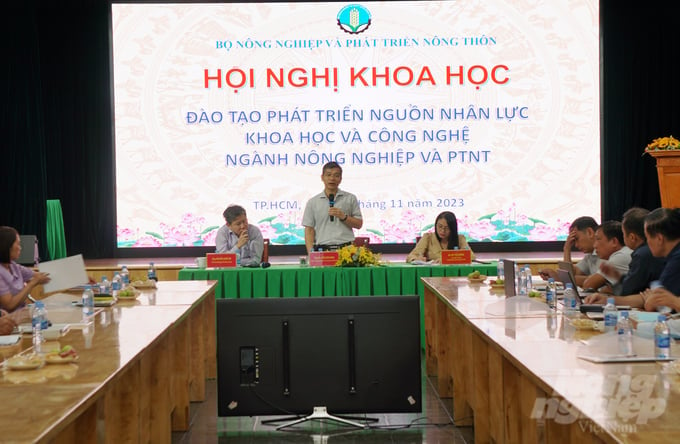
In response to various contributions and suggestions from various institutes, schools, and agencies, Mr. Nguyen Huu Ninh, Deputy Director of the Department of Science, Technology, and Environment, stated that the research funding for science and technology is expected to further decrease in 2024, which will impact regular salary payments for the 11 institutes under the Ministry of Agriculture and Rural Development. On the other hand, the basic salary levels are increasing, posing a burden on the heads of public career institutes.
Mr. Ninh added that the Ministry will develop a plan for human resource development, including personnel in science and technology, with suitable policy regimes to support them. Moreover, the Department of Science, Technology, and Environment will revise regulations to contribute to the improvement of human resource training.
According to Mr. Nguyen Xuan An, Deputy Director of the Department of Organization and Personnel, the Ministry of Agriculture and Rural Development issued the Strategy for Science and Technology Development and Innovation in the Agriculture and Rural Development sector until 2030, with a vision towards 2030 on January 16, 2023.
The Strategy aims to develop innovative science and technology as a crucial driving force to build a productive, high-quality, efficient, and competitive agriculture regionally and internationally, reinforced by sustainable, modern agriculture and rural development. Furthermore, it aims to establish a system of agricultural science and technology organizations, capable of creating breakthroughs with scientific value and high-tech products. The strategy also emphasizes the adoption and mastery of advanced international technologies, transferring, applying, and replicating them in production practices, contributing to increasing income, improving the livelihoods of farmers, protecting the environment, responding to climate change, and reducing greenhouse gas emissions.
Translated by Nguyen Hai Long
![Reducing emissions from rice fields: [3] New values generated from carbon credit](https://t.ex-cdn.com/nongnghiepmoitruong.vn/608w/files/content/2025/05/19/dsc09613-144700_71-150957.jpg)
(VAN) In addition to helping safeguard the environment, the low-emission rice cultivation model also generates new opportunities for farmers by leveraging the carbon credit market.
![Ho Chi Minh city adapts to climate change: [1] Vulnerable in the whirlwind of development](https://t.ex-cdn.com/nongnghiepmoitruong.vn/608w/files/duyenht92/2025/05/19/3131-ngap-nongnghiep-163121.jpg)
(VAN) As the country's economic engine with a rapid urbanization rate, Ho Chi Minh city is facing increasingly serious consequences of climate change.
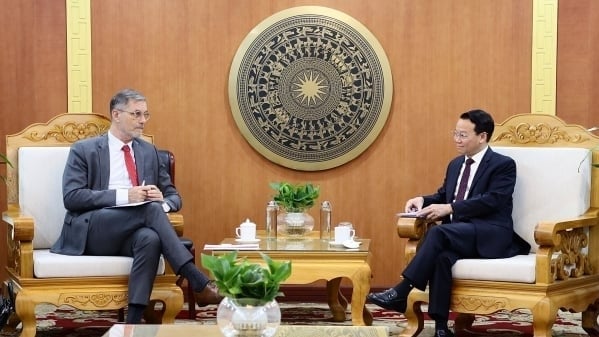
(VAN) On May 21, Minister of Agriculture and Environment Do Duc Duy worked with Mr. Olivier Brochet, Ambassador Extraordinary and Plenipotentiary of the French Republic to Vietnam.
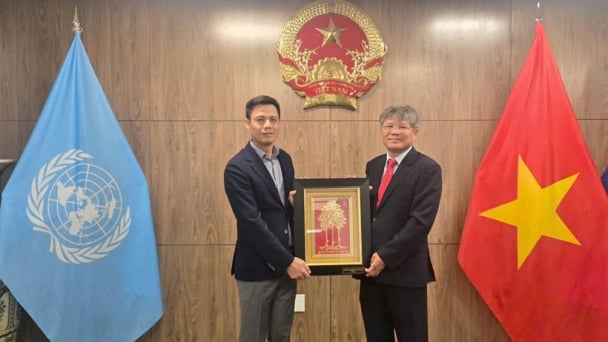
(VAN) VRG recently conducted a visit and working trip to the United States to demonstrate its efforts in redefining the role of rubber enterprises in the global value chain.

(VAN) In 2024, over 295 million people across 53 countries and territories faced acute hunger—an increase of almost 14 million people compared to 2023, while the number of people facing catastrophic levels of hunger reached a record high.

(VAN) World Environment Day 2025 (June 5) carries the theme 'Beat Plastic Pollution' continuing to emphasize the global urgency of addressing the plastic waste crisis.

(VAN) This was the assessment shared by experts at the workshop titled 'Assessing the Role and Potential of Low-Emission Rice Production Systems in Vietnam,' held on the morning of May 19.